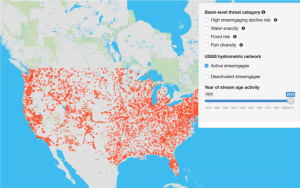- This has been a hectic summer. We are excited to announce that Kyle Leathers just joined the lab–welcome to our first graduate student!
- We also finalized Lise‘s postdoc project on the alteration-invasion nexus in rivers nation-wide, and she will be soon moving on to bigger things in Seattle. Visiting graduate student Jordi went back to the Catalan Institute for Water Research after a productive stay analyzing stable isotope data from Catalan streams.
- We are NSF funded! An exciting Macrosystems collaborative project (‘Scaling Climate, Connectivity, and Communities in Streams’) will start on January 1st. More on this soon!
- Albert coauthored a Science perspective on the use of remote sensing data to determine the distribution and trends in global freshwater habitat.
Author: Albert Ruhi
June 2018 updates
- Albert attended the ‘Boundary Spanning Symposium‘ at the National Socio-Environmental Synthesis Center (SESYNC), and presented on the effects of dams on river flow regimes.
- Albert & Jordi participated in the ‘Eyes on the Eel‘ synoptic survey, and enjoyed a deluxe tour at the UC Angelo Reserve with Mary Power.
- Two proposals are on the works, one of them involving restored wetlands in the San Francisco Bay.
May 2018 updates
- May was travel month! Albert participated in a Powell Center workshop on the Budyko framework–this interdisciplinary working group is ongoing and will present in next AGU Fall Meeting on the cumulative effects of dams on flow regime alteration.
- The Berkeley Freshwater Ecology labs also attended the Society for Freshwater Science Annual Meeting in Detroit, MI. It was a great combination of science & fun.
- Meanwhile, visiting researcher Maria went back to Spain after a productive stay analyzing arthropod metacommunity data from intermittent streams.
- Last but not least, the lab renovations were completed!
New paper in Global Change Biology
Interested in how hydropower dams affect flow regimes and downstream biodiversity? Here we sought to understand the ecological effects of flow management for hydropower (hydropeaking). Collaborating with Darold Batzer’s lab at UGA, we found that hydropeaking can spatially synchronize trait fluctuations and simplify the functional structure of downstream invertebrate communities. Still interested? Then read more below!
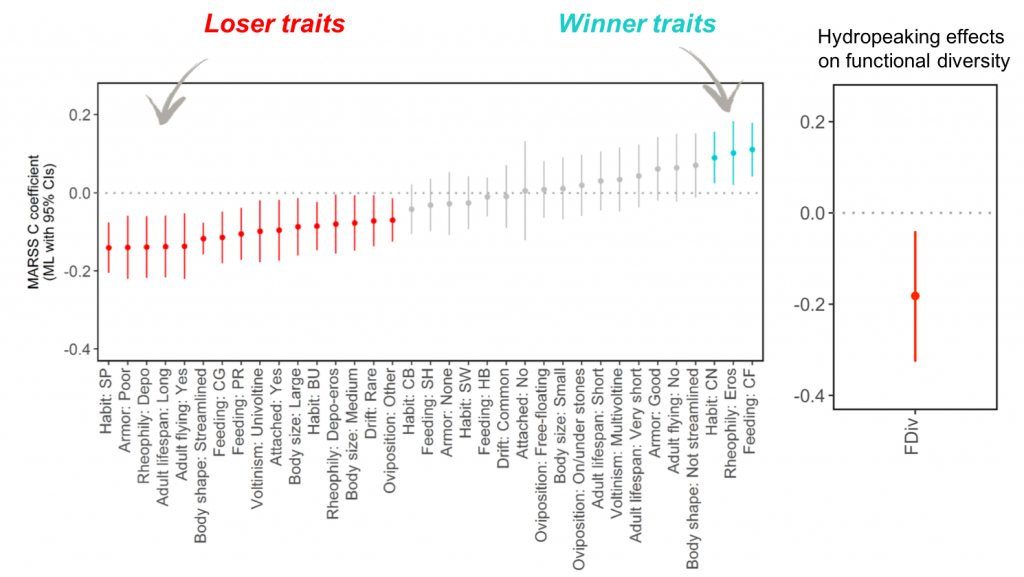
Abstract
Novel flow regimes resulting from dam operations and overallocation of freshwater resources are an emerging consequence of global change. Yet, anticipating how freshwater biodiversity will respond to surging flow regime alteration requires overcoming two challenges in environmental flow science: shifting from local to riverscape‐level understanding of biodiversity dynamics, and from static to time‐varying characterizations of the flow regime. Here, we used time‐series methods (wavelets and multivariate autoregressive models) to quantify flow‐regime alteration and to link time‐varying flow regimes to the dynamics of multiple local communities potentially connected by dispersal (i.e., a metacommunity). We studied the Chattahoochee River below Buford dam (Georgia, U.S.A.), and asked how flow regime alteration by a large hydropower dam may control the long‐term functional trajectory of the downstream invertebrate metacommunity. We found that seasonal variation in hydropeaking synchronized temporal fluctuations in trait abundance among the flow‐altered sites. Three biological trait states describing adaptation to fast flows benefitted from flow management for hydropower, but did not compensate for declines in 16 “loser” traits. Accordingly, metacommunity‐wide functional diversity responded negatively to hydropeaking intensity, and stochastic simulations showed that the risk of functional diversity collapse within the next 4 years would decrease by 17% if hydropeaking was ameliorated, or by 9% if it was applied every other season. Finally, an analysis of 97 reference and 23 dam‐affected river sites across the U.S. Southeast suggested that flow variation at extraneous, human‐relevant scales (12‐hr, 24‐hr, 1‐week) is relatively common in rivers affected by hydropower dams. This study advances the notion that novel flow regimes are widespread, and simplify the functional structure of riverine communities by filtering out taxa with nonadaptive traits and by spatially synchronizing their dynamics. This is relevant in the light of ongoing and future hydrologic alteration due to climate non‐stationarity and the new wave of dams planned globally.
New paper in Nature Sustainability
Our new work on streamflow gages and the importance of long-term data is out! See abstract below, and check out our Shiny App to assess availability of streamflow data over space and time:
Abstract. Reliable accounting of freshwater resources is key to managing hydrologic risk and balancing freshwater allocations for ecosystems and society. However, recent claims have argued that the global hydrometric network is not keeping pace with monitoring needs. Here we examine this question globally and reveal that over the past four decades the number of streamgaging stations reporting to global, open datasets has been declining. In the United States, a declining trend was reversed by the turn of the century, but high volatility at the river basin scale threatens continued monitoring in over a quarter of the river basins of the conterminous United States. We propose to prioritize streamgaging rescue by identifying watersheds that heavily rely on hydrologic data to support freshwater biodiversity conservation, and to manage flood or water scarcity risk to human populations. We argue that actions at different institutional levels are needed to secure the accumulation of long-term data needed for sustainable water management.
It’s been a busy couple of weeks!
The past two weeks have been rather busy. First, we hosted Chris Trisos, Postdoc Fellow at SESYNC, to continue working on a paper on Modern Portfolio Theory applied to conservation science.
We then welcomed Jordi-Rene Mor, visiting graduate student from the Catalan Institute for Water Research (ICRA) and the University of Barcelona. Jordi will be joining us for 4 months, to work on stable isotope data from a number of Catalan Mediterranean rivers affected by drought and wastewater effluents. Welcome, Jordi!
Last but not least, we discussed novel flow regimes and submitted a grant proposal to the California Sea Grant (Special Focus Awards). If we get funding we will be doing some exciting food-web research in reference and restored wetlands at the South Bay Salt Pond Restoration Project.
More soon!
Inaugural joint lab retreat
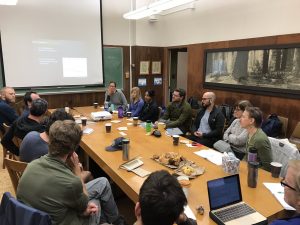 Last Saturday the Power, Carlson, Grantham, and Ruhi labs “staycationed” together. After a morning of science talks on campus, we explored the ponds of Briones Regional Park. We were lucky enough to witness several California newts mating–see below a close-up of these so-cute (but highly-toxic) creatures. The retreat concluded at Triple Rock Brewery in Berkeley. Great day all around, lots of interesting conversations and fun! Will repeat soon.
Last Saturday the Power, Carlson, Grantham, and Ruhi labs “staycationed” together. After a morning of science talks on campus, we explored the ponds of Briones Regional Park. We were lucky enough to witness several California newts mating–see below a close-up of these so-cute (but highly-toxic) creatures. The retreat concluded at Triple Rock Brewery in Berkeley. Great day all around, lots of interesting conversations and fun! Will repeat soon.

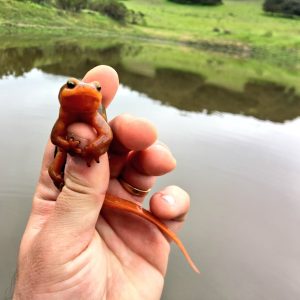
Visiting scientist from Spain
Maria Sanchez-Montoya is joining us for three months. She is visiting from the University of Murcia (Spain) and will develop a project on the animal community responses to river drying. Welcome, Maria!
Welcome, Lise!
We are very excited to announce that Lise Comte started her postdoc position at the Ruhi Lab. She will be working on two projects on (i) temporal responses of riverine fish communities to flow and temperature anomalies at the global scale, and (ii) the alteration-invasion nexus in the U.S. More soon. Welcome, Lise!
Taking off
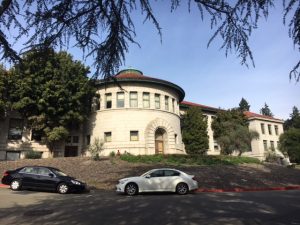
The Ruhi lab is taking off @ 319 Wellman Hall. Stay tuned for updates!

